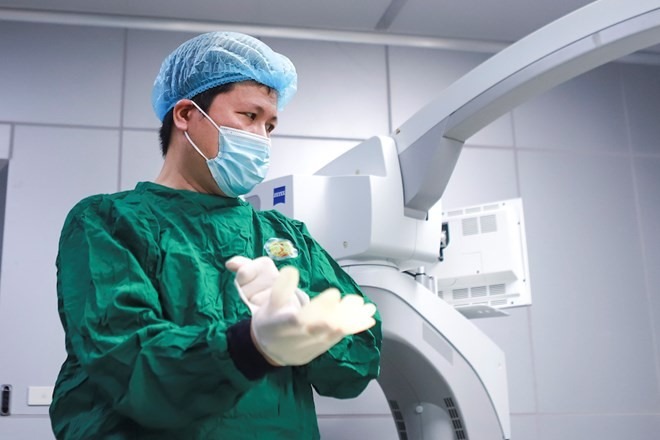According to medical experts, the need for beauty is legitimate, but people need to be sober before deciding to inject or intervene in the body.
In recent times, people's demand for beauty has increased and has changed a lot compared to before. Besides, due to the strong development of new technology and techniques.
 |
| According to medical experts, the need for beauty is legitimate, but people need to be sober before deciding to inject or intervene in the body. |
Therefore, people want to focus on modern beauty methods, such as laser technology, filler injection, botox and other non-invasive therapies, regenerative cell technology.
Dr. Tong Hai, Head of the Department of Microsurgery and Reconstruction, Center for Plastic Surgery and Reconstruction, National Burn Hospital, said that in the past, many people may have been shy when it comes to beauty. However, with the development of social networks and abundant information sources, people have become more comfortable and have more knowledge about cosmetic services.
At the Center for Plastic and Reconstructive Surgery, National Burn Hospital, there have been recorded cases of patients coming for treatment after experiencing cosmetic complications.
Patients fall into two main groups. The first group is those who use the service by amateur or inexperienced doctors who do not screen for complications.
Group two are cases performed at spas, beauty salons, not clinics, performed by staff who are not doctors or medical staff. This group often leaves behind consequences that are difficult to overcome.
Dr. Hai said he was very concerned because some complications could leave long-term consequences for patients, affecting not only their health but also their psychology and quality of life.
Accordingly, many patients come with a state of panic and anxiety when they have a stroke. Having to undergo treatment is not only costly but also psychologically damaging to the patient.
Explaining this situation, according to Dr. Tong Hai, is that many people do not have enough knowledge about cosmetic methods, risks and possible complications.
They often rely on advertisements or opinions from friends, easily getting caught up in new cosmetic trends without carefully considering safety and effectiveness.
In addition, many people have the mentality of looking for cheap services, leading to choosing facilities with low prices but not ensuring quality. This can lead to serious consequences.
Some people choose unqualified or unlicensed cosmetic facilities. These facilities may not ensure safety and service quality, and there is a risk of HIV, hepatitis, syphilis, etc. because the workers are not medical staff and do not understand the sterile process, leading to cross-infection.
In addition, many people do not consult a doctor or specialist before deciding to undergo cosmetic procedures. The lack of professional advice can lead to poor decisions.
To effectively manage cosmetic facilities and minimize complications, according to Dr. Hai, there are some important measures that need to be taken such as regular inspections.
The State management agency has very strict regulations on licensing qualified facilities (specialized clinics, hospitals) with strict standard procedures in operations and periodic inspections. However, in reality, it is not possible to thoroughly detect violations in order to promptly handle them.
Accordingly, the health department can only inspect facilities licensed by the department. For unlicensed facilities that continue to operate illegally beyond their scope of practice, the government needs to enact laws to control these subjects, and consider criminal prosecution if fatal accidents occur.
In addition, it is necessary to strengthen professional training. Accordingly, doctors and staff in the cosmetic industry need to be thoroughly trained in specialized techniques, including intensive care, safety in procedures and patient care procedures. Organizing certificate courses and updating knowledge should be carried out at formal training facilities.
In addition, there should be communication campaigns to raise people's awareness of choosing reputable cosmetic facilities and choosing qualified doctors. Customers need to be clearly informed about the risks, drugs, and materials that can cause problems when performing cosmetic services.
Establish a mechanism for people to easily report incidents occurring at cosmetic facilities. This helps authorities have information to handle and investigate.
Create clear rules of responsibility. Beauty salons need to have clear rules of responsibility for ensuring customer safety. If an incident occurs, appropriate measures must be taken to handle and compensate.
By taking these measures, it is possible to minimize the risk of complications and improve the quality of cosmetic services, while protecting the health and interests of consumers.
For the people, to perform safe cosmetic surgery, experts recommend going to licensed clinics, cosmetic centers, cosmetic hospitals, and general hospitals with cosmetic departments - where there are highly specialized doctors and modern equipment.
These facilities are often required to adhere to strict safety regulations. These hospitals are often staffed with professional doctors and are able to handle complications if they arise.
People should also consult with a cosmetic surgeon. The surgeon can advise on the options and risks, and help determine which procedure is best suited to each person’s needs and health status.
At the same time, learn about the main effects of drugs, chemicals, and implant materials when introduced into the body, their unwanted side effects, risks, and possible complications. (Pay attention to ingredients that can cause common allergic reactions, place of manufacture, expiration date, etc.).
First of all, doctors must be formally trained with a university degree, have a practice certificate, need to study advanced specialties (CKI, CKII, Master, PhD), have experience and enough practice time of 36 months (if working in the private sector) and work in a hospital, need to have doctors to guide and ensure.
Proficiently perform professional skills, have professional ethics, comply with medical ethics, protect patients, and continuously update specialized knowledge.
For people who want to beautify themselves, according to Dr. Hai, first of all, if you want to have surgery, you must be an adult with full capacity for behavior and take responsibility for your own decisions when having cosmetic surgery:
People who should not undergo cosmetic surgery are those with incurable chronic diseases such as heart failure, kidney failure, cirrhosis; blood diseases (acute - chronic myeloid leukemia), prolonged anemia, difficult-to-control diabetes, blood clotting disorders (maintaining continuous medication); and systemic diseases in the progressive stage. For example, people with lupus erythematosus, scleroderma... when undergoing surgery will flare up, causing serious illness.
People with psychological instability, anxiety depressive disorders, schizophrenia or long-term dependence on stimulants are also contraindicated.
Source: https://baodautu.vn/canh-bao-nguy-co-tien-mat-tat-mang-vi-ham-lam-dep-gia-re-d225936.html




































































































Comment (0)